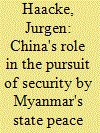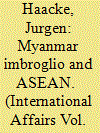| Srl | Item |
| 1 |
ID:
094448


|
|
|
|
|
| Publication |
2010.
|
| Summary/Abstract |
This article focuses on both the opportunities and challenges that the People's Republic of China (PRC) presents for Myanmar's State Peace and Development Council (SPDC) in its quest for security. It does so in the context of significant external pressures on the military regime and its ongoing struggle to consolidate the state. The article argues that though Myanmar's military has successfully relied on Beijing for economic development as well as diplomatic protection against efforts to take the junta to task for its political intransigence in the face of Western demands for a more inclusive political process towards national reconciliation, Beijing's political support is actually more ambiguous than first meets the eye. It also suggests that China's links to the areas in which ethnic armed ceasefire groups formerly making up the Communist Party of Burma exercise significant if not complete authority have complicated efforts by Naypyidaw to impose its perspective on state and nation building along at least part of the Sino-Myanmar border. Rising frustration with perceived Chinese involvement and influence as well as strategic calculations about how to exploit potential opportunities have led the SPDC - in the run-up to the 2010 elections - to explore the possibility of improved relations with Washington and to use force in Kokang despite the risks such a move entails.
|
|
|
|
|
|
|
|
|
|
|
|
|
|
|
|
| 2 |
ID:
095121


|
|
|
|
|
| Publication |
2010.
|
| Summary/Abstract |
Following the adoption of a new constitution by national referendum, Myanmar's military junta is set to organize multiparty elections in 2010. Not least to influence Myanmar's leadership, with regard to the conditions Washington believes necessary for credible elections, the United States announced in September 2009 that it would embark on a new approach towards Naypyidaw. This will focus on a high-level dialogue while keeping existing sanctions in place. The Obama administration has asked the Association of Southeast Asian Nations (ASEAN) to support this new approach. Against the backdrop of the deep divide between the ruling generals and Aung San Suu Kyi, and the continued conflict between Naypyidaw and armed ethnic nationalities, this article asks: How strong is ASEAN's record when it comes to influencing the State Peace and Development Council (SPDC) in relation to matters of national reconciliation and political transition? What factors explain ASEAN's approach towards Myanmar? What prospect, if any, is there that ASEAN states can influence Myanmar's political developments before the 2010 elections? The article argues that ASEAN has not moved beyond a collective criticism which aims to induce Naypyidaw to respond positively to the demands of its international detractors. ASEAN's norms, different political identities and geopolitical interests coupled with the SPDC's prickliness have limited the consensus on Myanmar. Naypyidaw's calculations about relations with Washington, rather than ASEAN's 'enhanced interactions' with the military government, and domestic political dynamics are likely to be the crucial determinants of further developments in the context of the 2010 elections.
|
|
|
|
|
|
|
|
|
|
|
|
|
|
|
|